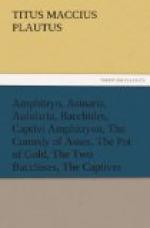I am, I say. How many times do you need to be told?
Amph.
Sed quid ais? num obdormivisti dudum?
(reflecting)
But look here, you were not asleep a while
ago, were you?
Sos.
Nusquam gentium. 620
Not a bit of it, sir.
Amph.
Ibi forte istum si vidisses quendam in somnis Sosiam—
Then perhaps,
if you had seen that, well, that Sosia of
yours in your
dreams—
Sos.
Non soleo ego somniculose eri imperia
persequi.
vigilans vidi, vigilans nunc te video,
vigilans fabulor,
vigilantem ille me iam dudum vigilans
pugnis contudit.
I don’t do my master’s orders drowsily. Wide awake I was, eyes open; I am wide awake with ’em open on you now; I am wide awake telling my story; and I was wide awake when he hammered me a while back, yes, and (ruefully) he was wide awake.
Amph.
Quis homo?
Who?
Sos.
Sosia, inquam, ego ille. quaeso, nonne intellegis?
Sosia, I tell you, that me. Pray do not you understand?
Amph.
Qui, malum, intellegere quisquam potis est? ita nugas blatis.
How the devil
can any man understand? Such stuff and
nonsense!
Sos.
Verum actutum nosces, quom illum nosces servom Sosiam.
(significantly)
Well, you will know what I mean very
soon, once you
know that servant Sosia.
Amph.
Sequere hac igitur me,
nam
mi istuc primum exquisito est opus.[18]
(628)
(going toward
house) Come then, this way. This matter
needs my investigation
first of all. (stops to examine
house from distance
and talks with Sosia)
II. 2.
Scene 2.
ENTER Alcmena INTO DOORWAY.
Alc.
Satin parva res est voluptatum in
vita atque in aetate agunda 633
praequam quod molestum est? ita cuique comparatum
est in
aetate hominum;
ita divis est placitum, voluptatem ut maeror comes
consequatur:
quin incommodi plus malique ilico adsit, boni si
optigit quid.
Oh, are not the pleasures in life, in this daily round, trifling compared with the pains! It is our common human lot, it is heaven’s will, for sorrow to come following after joy: yes, yes, and to have a larger share of trouble and distress the moment something nice has happened.
nam ego id nunc experior domo atque
ipsa de me scio, cui voluptas
parumper datast, dum viri mei mihi potestas videndi
fuit
noctem unam modo; atque is repente abiit a me hinc
ante lucem.
sola hic mihi nunc videor, quia ille hinc abest
quem ego amo
praeter omnes.
640
plus aegri ex abitu viri, quam ex adventu voluptatis
cepi.




